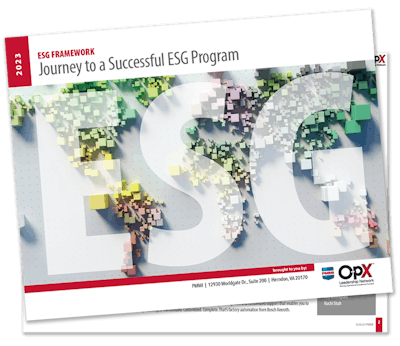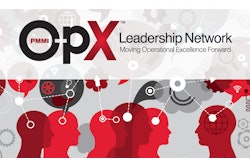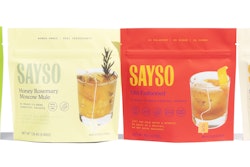
Sustainability is no longer a buzzword but a strategic imperative to do the right thing by the planet, enhancee reputation, reduce costs, and ensure long-term viability. Along with consumer packaged goods (CPG) companies, contract manufacturers (co-mans) and contract packagers (co-packers) must embrace Environmental, Social, and Governance (ESG) initiatives for their part of the supply chain.
At PACK EXPO Las Vegas, the OpX Leadership Network released its newest work product, “ESG Framework: Journey to a Successful ESG Program”, which lays out the roadmap to sustainability. The document can help a company, no matter where it is in terms of sustainability, create goals to match its situation and abilities, and then to do more.
How can co-mans and co-packers be environmentally sustainable?
Co-mans and co-packers should start with the basics, which are understanding how you rank among your peers and low capital expenditure (capex) approaches that address the environmental sustainability concerns of their customers.
“One way to start is to look at the customer’s sustainability reports. What's in that those sustainability reports and is viewed as a priority? Co-mans and co-packers should know their contribution to the carbon footprint of the product that they are asked to produce,” says Roy Greengrass, president of The ESG Group, an ESG consulting company.
Greengrass, a previous OpX member with decades of experience as an engineering director for several CPGs, including Impossible Foods, contributed heavily to the ESG work product. He says specific goals should be tailored to the materiality matrix of the specific co-pack and what technology it has in use. Common objectives among contract services are waste minimization, zero or reduced waste to landfill, and carbon footprint reduction.
Transparency on sustainability goals and progress can help CPGs find co-mans or co-packers who line up with their ESG initiatives. Greengrass suggests co-mans and co-packers can consider certifications like ISO 14001 and GRI global reporting standards, depending on their size and customer expectations. However, at a minimum, they should be publishing a sustainability report on carbon environmental impact.
 | Pouches Prove More Sustainable than Cartons for Cocktail Tea Bags |
Are your operations socially sustainable?
Social sustainability goals can be broken into three sections. The first focuses on employee well-being, welfare, and retention. Data sources that businesses should already have include HR records, safety records, turnover rates, safety policies, labor standards, and diversity. Co-mans and co-packers should aim to create a safe and inclusive workplace.
Beyond the internal are external goals, such as encouraging voluntary community work among employees, charitable donations, and contributing to the community. The third section is focused on supply chain, which includes awareness of how socially sustainable a company’s sourcing and production is, along with tracking of products and materials.
“Start where you have the most influence and control, which is within your own four walls. So occupational health and safety, employee engagement, [and] human rights. And then extend to outside, so impacts on communities, where can we extend supplier code of conduct, things of that nature that we expect from external parties,” says Jared Ward, sustainability consultant at Antea Group, a non-profit environmental consulting firm, and contributor to the ESG work product.



























